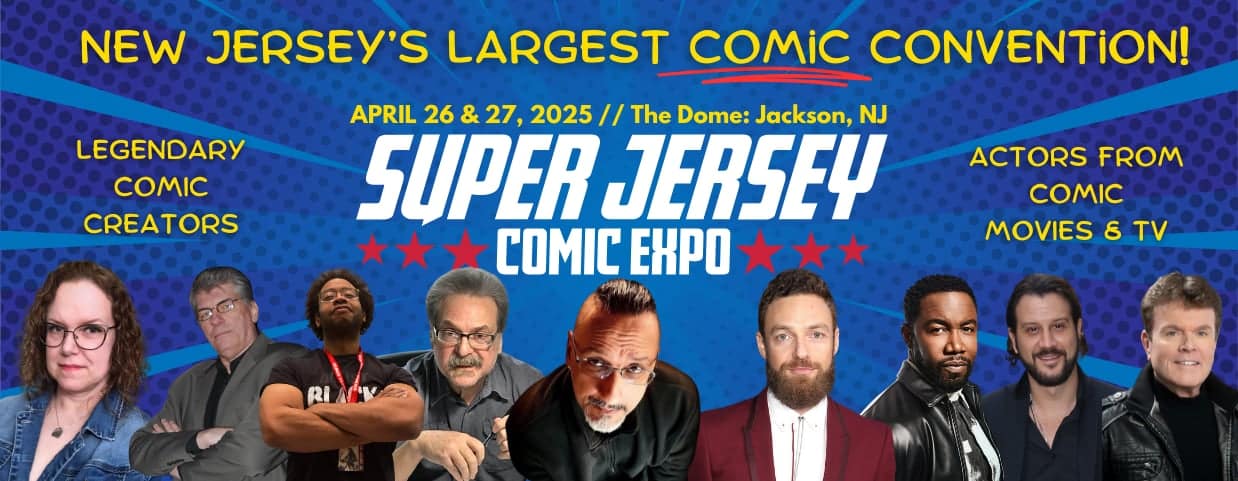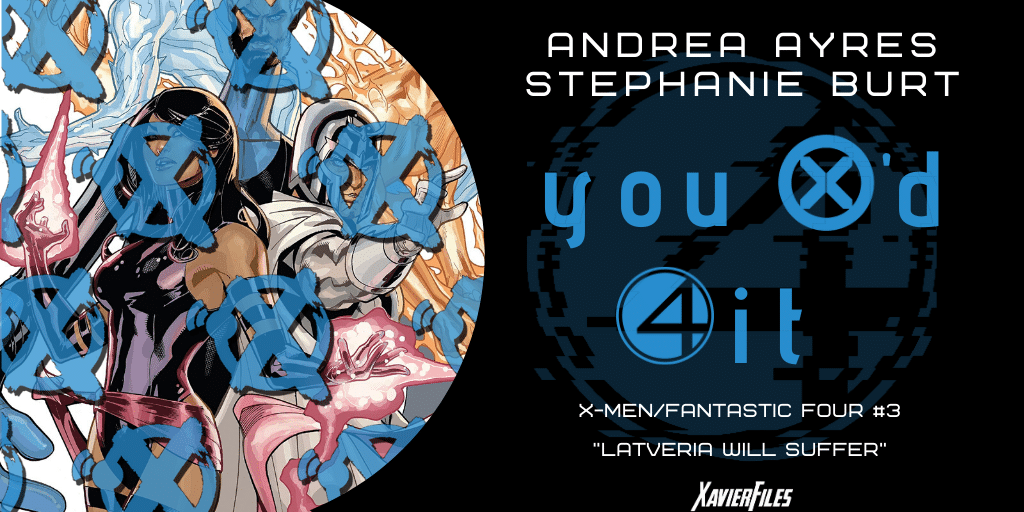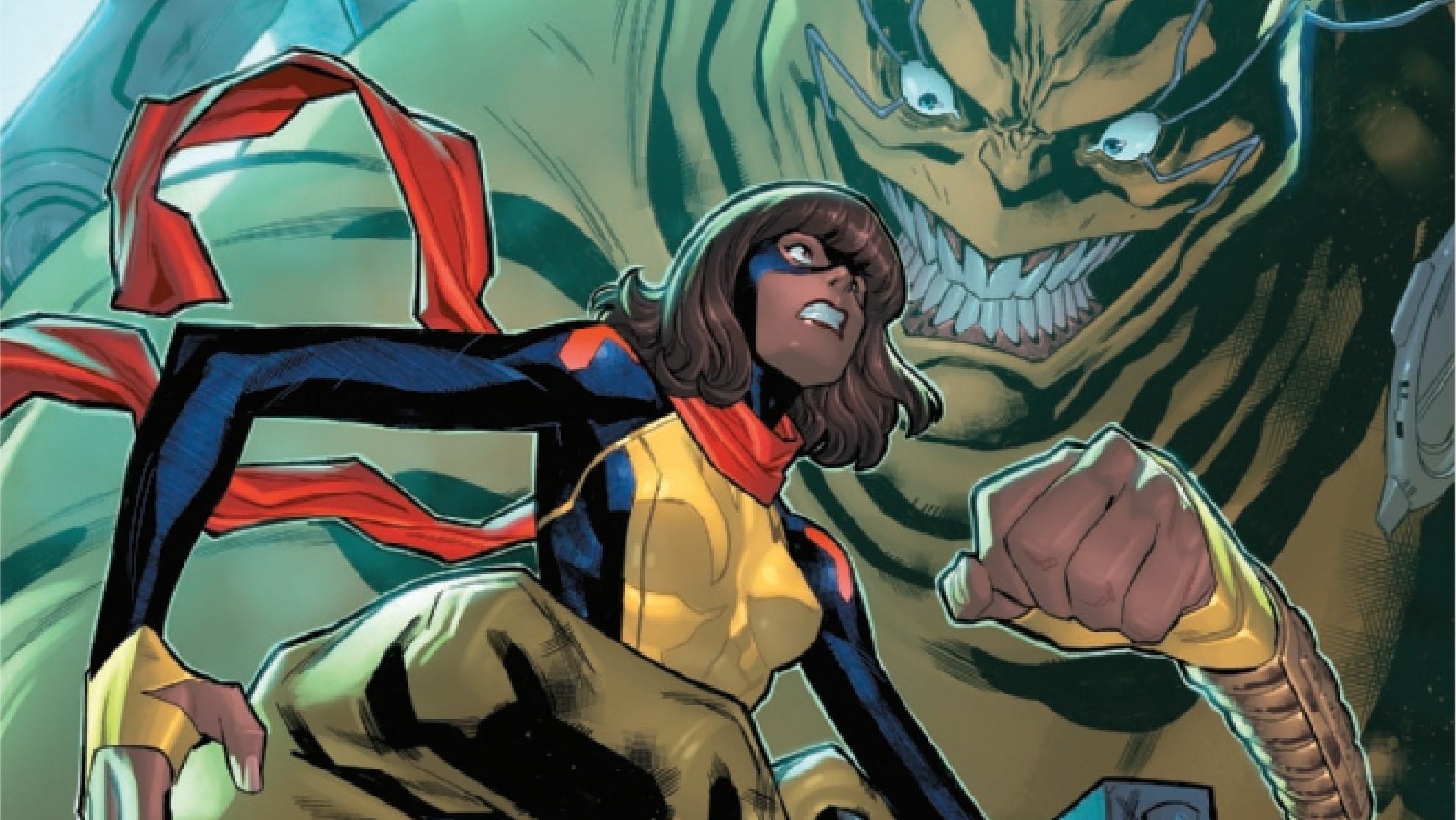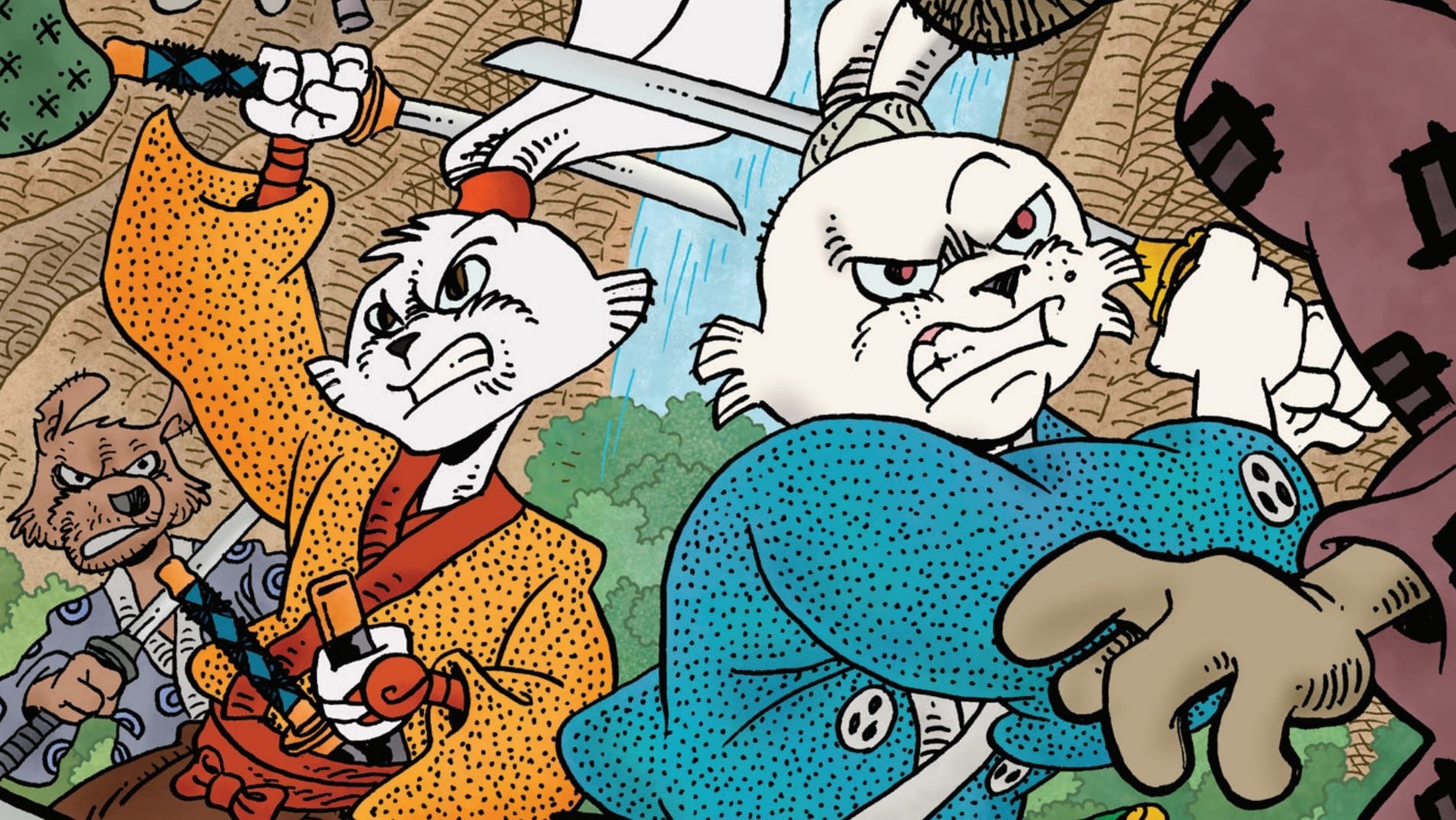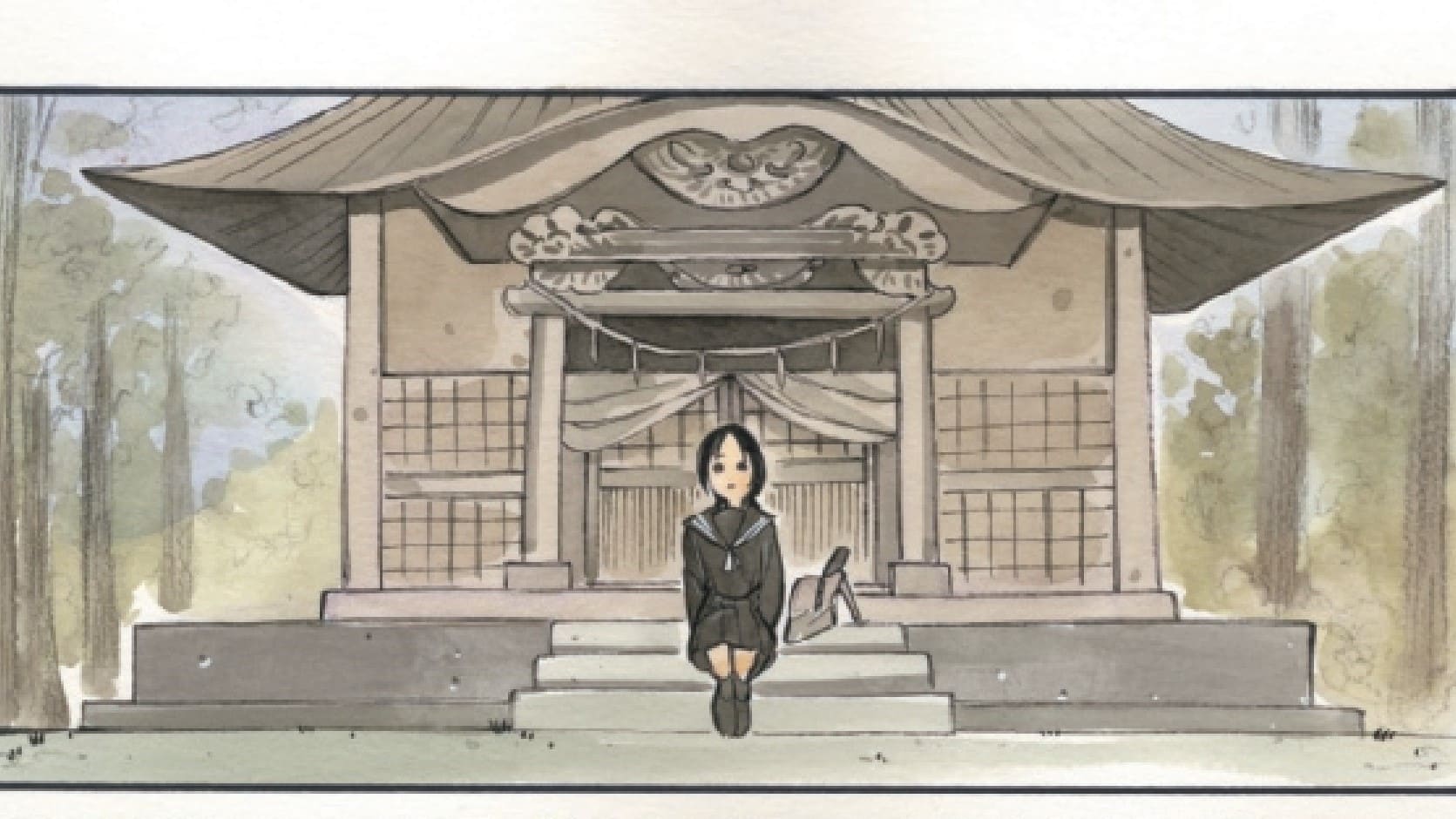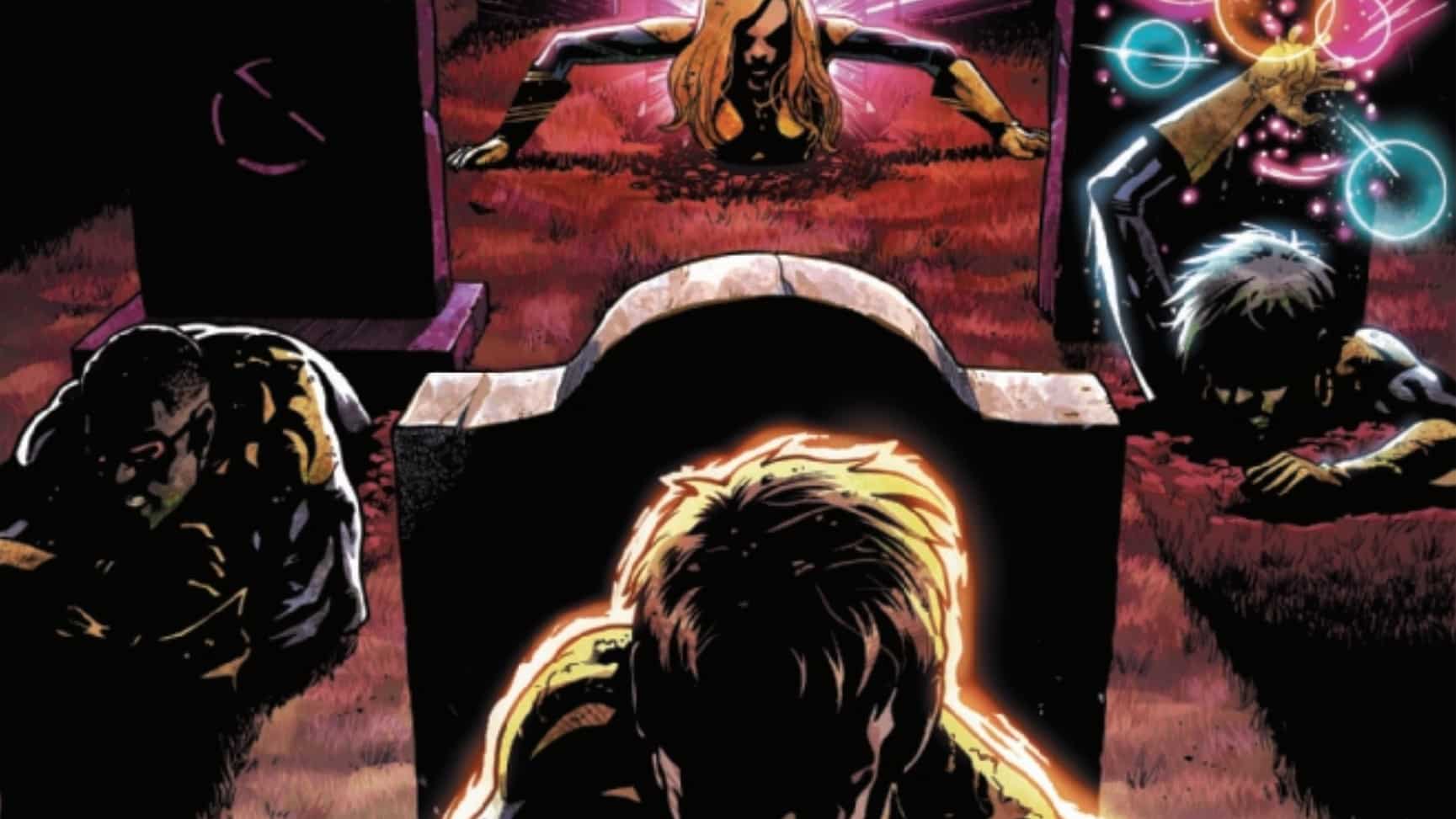Mutants have a new home in Krakoa. They have come from far and wide, from all backgrounds, to join a community of their fellow Homo Superior. But one Omega Mutant has ignored the call. In X-Men/Fantastic Four #3 Chip Zdarsky, Dodsons Terry & Rachel, Laura Martin, Dexter Vines and Karl Story come together to tell the tale of Franklin Richards, the son of Marvel’s First Family, as he chooses between his life on Yancy Street, and the world of Krakoa.
Andrea Ayres: Welp. We’re back to it and literally nothing in the world has changed so we’ll just dive right into issue #3. Overall, the pacing of the issue feels rushed to me. From the get-go when we’re in pursuit of FF to the final panel. Some of the action sequences feel shoehorned in place and the same is true of some of the emotional beats between the characters. There’s quite a bit happening and I’m not positive this issue does the best job of giving us the space to get the most out of all that’s happening. What did you think about the pacing?
Stephanie Burt: Yeah, this is the first issue that isn’t working for me overall (after weeks of defending FF/X 1-2 online)! I’m not getting inside the characters’ heads enough, and I feel like I’m being yanked from beat to beat, instead of watching the characters’ decisions guide the action.
The Fast And The Furious: Latveria Drift

SB: Maybe that’s because I’m in a mood from social distancing and want to read slower-paced stories. Maybe that’s because this issue– unlike the last two– feels like an FF book with an X-team as guest antagonists: the interesting relationship beats all happen within the Richards family or between Richards family members and Doom. Maybe the reason is that this issue, for the first time, all the players are in the same place: rather than cutting among distant locales, Zdarsky has to handle an island full of characters quarreling and working at cross-purposes
He also has to handle characters pivoting from their initial– and more emotionally comprehensible– positions. What exactly made Reed come around? His pivot was sudden, and not in a satisfying way. Was it Reed wanting to show he’s more moral than Doom?
AA: It feels hard to say what exactly it was a response to because I don’t feel like we were privy to any of his emotional journey to get to that point. Like…at all. You hit it on the head though.
We’re being asked to deal with so much. I mean, we’ve got the Von Doom particles bit, we’ve got the military justice bit, a restructuring of power polarity, Reed’s absolute sudden emotional turnaround regarding his son’s wishes…
The Reed turnaround felt the most jarring for me. On page 23 we’re smacked with Reed’s apology to Franklin. It hits us like a cold dead fish to the face. There hasn’t been much in the way of developing this storyline. I guess I was disappointed in that because I want to know how a character matures or arrives at a decision, especially one seemingly as consequential to the series as this one. I realize that may be a personal squabble. I just need a lot of emotional tenderness right now. Did you hear that Zdarsky? Tenderize me like a flank steak.
Worth my saying, even if Franklin wasn’t a ‘good man’ he’d still deserve the right to make decisions about his future. I will note, however, Reed calling him a man. A clear indication he no longer recognizes him as a child and as his own person? Would be curious to hear your thoughts on this?
SB: It’s just shockingly non-responsive. “I need you to know that you’d still be a good man without your powers. That’s why I feel pretty OK about implanting a tracer in you and doing something designed to prevent you from using your inherent powers to find your people.” If anything, the moral dilemmas around Franklin– and Reed!– tend to be “can you be a good person even if you possess this much power?”
AA: Ugh, such a good point. It’s funny to me that the focus is on how much power one has instead of how that power is used. I mean that’s a commentary on how we view power in society in general. Some power is fine, for the right person or group anyway. That same affordance doesn’t extend to those outside the status quo, those scene recognized as the default or with considerable privilege. When a person or group who does not have privilege seeks to assert their rights all of a sudden the status quo begins to question power structures. They are like, “Whoa. Hang on, maybe this power business isn’t good. Not my power though, the amount of power I have is fine. It is expected. Yours is the bad one because it threatens me.” Help. I’ve gone off on a loop.
SB: If you’ve been following the way FF/X handles the mutant metaphor, this dialogue looks even worse. “Look, kid, I’ll let you go on blockers/ start medical transition/ take part in your disability community/ present yourself as you want to present in public. But I need you to know that if you weren’t trans/ weren’t disabled/ were normal and neurotypical, you’d still be a good person.” It’s one step away from “I wish you weren’t trans, kid, but since I’ve come to accept that I don’t get to choose…” That’s not acceptance. It’s happy talk and resignation. At least Sue doesn’t talk to Franklin that way.
I’d love to know what people who have been following Reed very closely for decades think about this version of the guy.
Rules & Authority

AA: The other part of this scene that bummed me out was that we don’t even get the benefit of seeing Franklin and Reed’s emotional expressions because the panel view is pulled back. I would have loved to see the Dodsons’ work shine here, but I’m also greedy. I reckon this scene in general feels a bit jarring is because we’re just now beginning to see Franklin set and enforce boundaries.
You don’t give orders to me anymore. I’m not four years old and I’m not Uncle Ben or Johnny.
Burn, but also TRUE.
SB: Way to dump on Uncle Ben and Johnny (but he’s right). That moment brings in another aspect of this issue that I liked a bit more: who gets to make decisions for other people? How and why? It’s easy to answer that question “Nobody does! We are all autonomous humans!” and that’s the right answer in daily life, among adults, but it’s the wrong answer in families with young children– when the adults must work out exactly how much autonomy to give the kids. And it’s the wrong answer in a public emergency, when the state must act to prevent a tragedy of the commons. Or an epidemic.
Reed’s position evolves as he comes to see his kid (however reluctantly) as no longer a child; he doesn’t have to worry about giving orders to people outside his family (or not here).
AA: Yo. Yes. There are definitely times when others may need to intervene in order to protect the health, safety, and well-being of others. Franklin asserting a boundary is really a beneficial form of social-emotional learning because he expresses a need and we actually see Reed responding directly to that need (whatever we may think of that response is another story). Hrmm, where does that put Doom in this mix?
SB: Doom’s position is simple: he’s the authority, he’s the state, he’s the Big Daddy and his word is law. He loathes Krakoa– and he says so– because Krakoa doesn’t work that way: all mutants are, potentially, Krakoan agents and Krakoan diplomats, which is cool but creates problems with the chain of command. Doom also thinks he’s earned his power, while mutants haven’t.
Magneto, understandably, defaults to seeing himself as Big Daddy. Which Kate can’t and won’t and probably shouldn’t accept.
AA: This is an important moment for Franklin, as it is for any human who has struggled to set boundaries with someone, especially a member of their family. Interestingly, in my research, I found how children view their intelligence mindset tends to be more fixed to how parents respond to failure.
“Overall, parents who see failure as debilitating focus on their children’s performance and ability rather than on their children’s learning, and their children, in turn, tend to believe that intelligence is fixed rather than malleable.”
Haimovitz, Kyla, and Carol S. Dweck. “Parents’ Views of Failure Predict Children’s Fixed and Growth Intelligence Mind-Sets.” Psychological Science, vol. 27, no. 6, June 2016, pp. 859–869.
I think that research has some implications for the Reed/Franklin dynamic.
SB: It does. Speaking of intelligence, when was the last time Beast recommended that someone take a science risk and the risk panned out well? And speaking of bright kids, what happened to Kate Pryde’s dialogue, which used to be wonderful? “This better work, Doom. Or I swear… you just made a whole lot of enemies.” Zzzzz. Besides, Doom already has lots of enemies! And why isn’t Kate more curious about all the Latverian technology? She’s a CS and engineering and physics genius, right? It’s like Zdarsky just forgot how to write her.
In his defense– sort of– Kate’s pretty boring when she’s just a combat leader: she may be a genius, but she’s also an extrovert who thrives on chosen relationships (don’t get me started about her love life). X-Men defaults to a story about chosen family; Fantastic Four about birth family–which most people (in our developed society) at some point want to leave (even if we come back).
And Doom, in an FF book, is the black sheep of the birth family, the uncle whose ties to the kids mean he won’t go away. Doubly so now that he’s linked to Valeria. “Son, we can’t trust him,” Reed warns Franklin. But Franklin doesn’t trust Reed either. And Valeria, historically, has trusted her godparent, Doom, pretty consistently.
Not that Zdarsky’s Doom is, remotely, trustworthy. Logan has killed a Latverian he thought was a Doombot. A Latverian with blue feathers: so, a mutant? But Ramona and Hugo claim that they’re the only young Latverian mutants who chose to side with the regime; the others have been imprisoned somewhere. Were they encased in Doombots and turned into flesh puppets with no control over their arms and legs, then sent to attack the X-Men in the hopes that the X-Men would kill one of them and become Latverian “criminals,” thus “justifying” Doom in sending out Sentinels?
That’s one hell of a legalistic damned-if-you-do damned-if-you-don’t scheme. If that’s not what happened, what happened?
AA: I couldn’t agree with you more about Kate in this issue. She’s been done dirty (I feel). You know how sometimes it feels like stories have an ending and then the rest is constructed to fit it, even if it doesn’t really make sense or allow for logic, flow or narrative consistency? I get a bit of that with this issue. Does that feel wrong? Am I a baddie for saying this?
The Enemy Of My Enemy…

SB: You are not a baddie. One thing this issue does well, in concert with #1-2: callbacks to the wonderful 1980s Claremont/Bogdanove series. 1980s Doom wanted to shame and show up Reed by offering life-saving medical help to Kate, and Kate needed Franklin’s emotional help in order to stay alive long enough to accept. Now Doom wants to shame and show up Reed by offering medical help to Franklin, and it’s Kate who gives Franklin the chance to go say yes.
In both series, Doom makes the offer of lifesaving medical tech into a way to display his superiority. It feels very timely. Compare China offering medical help to COVID-afflicted nations in Europe: offering medical help is a move in a diplomatic game!
AA: First of all, I’m happy you brought this up because I think it’s a fascinating examination of what appears to be a power polarity change happening IRL and in this comic. Polarity refers to international power structures and the ordering of power. First, we have China using the absolute vacuum of American authority and leadership to their every conceivable advantage. Worth noting that Russia has also provided aid to Italy in its COVID-19 response. Feels like Doom is operating from the same kind of mentality, where there is a vacuum of power, he sees an opportunity to engage.
SB: What is Doom Island doing in the western Pacific anyway? Was Latveria a 19th century imperial power, like the Dutch?
AA: Hell yah. Throwing up two thumbs up for the Dutch reference like a real cool individual. My college history professor would be *so excited* about this and then talk about the book Embarrassment of Riches. Which honestly, is a good book about the Dutch and their accumulation of wealth, I digress…
SB: Doom certainly wouldn’t mind operating an empire. He wants absolute control over what Latverians do. This issue may be the first time the series has faced head-on the fact that Doom won’t let Latverian mutants leave. Are there refuseniks?
Doom practices what my friends in that field would call realism in international relations: states never operate on selfless motives or for the good of the world. Instead, every state action (except open, total war) constitutes an agreement with incentives to honor it and disincentives to break it. States and leaders act for internal legitimacy, external security, and practical advantage, never because it’s the right thing to do.
Are the X-Men, as representatives of their nation-state Krakoa, behaving like realists too? How do they understand their sources of authority? Did Kate make the right call? Did she have the right to make it? It’s unusual– as far as I can tell– to see sympathetic superheroes honestly trying to figure out a military-style chain of command and responsibility.
AA: Is the nexus of this series “Everyone’s a little realist at the end of the day”?
SB: Was that an Avenue Q reference? I hope so. The debate over who has the right to make policy here– who makes the call and why?– strikes me as a special case of a general thing I love about Krakoa. Superhero comics fans have seen a bazillion stories of rebels overthrowing a bad government. We’re conditioned to root for the free spirits, for the coming revolution. But Dawn of X stories are, usually, stories about legitimacy and state formation, about what happens after you “win.” How do you have a functioning government that’s neither a faceless bureaucracy nor a cult of personality with a Dear Leader or a Big Daddy?
AA: That’s probably why I like them so much because I love thinking about the work of actual governance and good governance at that. Making policy is hard, especially if you want to make policy that involves input from every stakeholder. It’s easier for Doom because there’s no daylight between his personal wishes and those of the state, as is the case with most authoritarian regimes.
One thing I will say that I’ve been noodlin’ over with respect to this issue… We’re being asked to consistently question where and how power is derived. We are asked to question the source of power for mutants, for the X-men, for the FF… We are asked to question authority as well as who gets to establish and control it. I keep thinking about the Reed Richards Godpower entry back in issue #1.
It’s not only illustrative of the supposition for how the FF powers originate, but it’s also a suggestion for how all power structures may originate in this Universe. Maybe? Even if this diagram doesn’t turn out to be true and I can’t help but perhaps get a sense of that’s where we are headed…To me, it’d be neat if there was no such thing as a central, unifying force of power especially one that is perfect (as the name Godpower inherently suggests). I dunno maybe that’s wishful thinking on my part. There are limits to all forms and structures of power, from the family level to the state and beyond. How we respond to the limits of power and what we choose to do with the power given to us, that’s what matters.
SB: Speaking of responses: how do we respond to the visual elements of this issue? The Dodsons’ faces– especially the mutants– sometimes fall short of the expressive warmth they had in the first two issues (Kate and Valeria, in particular, look wooden, and Sue and Emma look too much alike). But the composition for the indoor scenes, with Kirbyesque molecule-spheres and blue backgrounds and diagrams, really shines: we’re looking, literally, at networks of power, at where power and energy originate in this world and where they can go.
AA: I totally, absolutely agree and have nothing to add because you’ve done it.
X-Traneous Thoughts

- Apparently, nothing brings people together like Doom.
- Can’t stop think about the Big Boi Doombots
- Emma always gets the best lines
Andrea Ayres writes about comics and culture. She loves research, coffee, and lifting weights.
Stephanie Burt is Professor of English at Harvard and the author of several books of poetry and literary criticism, most recently Don’t Read Poetry: A Book About How to Read Poems (Basic, 2019). Her nose still hurts from that thing with the gate.

